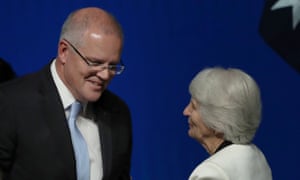Exclusive: PM was entitled to New Zealand citizenship from birth, but it is unclear whether his mother registered it
Questions have been raised about the accuracy of the citizenship declaration made by Scott Morrison in the aftermath of the constitutional eligibility crisis that engulfed the last parliament.
On Friday the New Zealand Department of Internal Affairs confirmed advice from citizenship law experts that Morrison was entitled to be a New Zealand citizen at the time of his birth – but that to take it up his mother would have had to apply for him to be registered.
Morrison’s office said the prime minister stood by his declaration that he was not a New Zealand citizen. Only the person concerned is able to check the register.
If Morrison was not registered, he would not be disqualified by section 44 of the Australian constitution, which prohibits dual citizens from running for parliament.
In his citizenship statement lodged with parliament in December 2017, Morrison declared that while his maternal grandfather was born in New Zealand, he was not a New Zealand citizen. This was because the “NZ government website confirms that citizens by descent can not pass NZ citizenship to children they have outside NZ”.
Anna Hood, a specialist in immigration law at the University of
Auckland, told the Guardian Morrison’s statement was “problematic”
because it did not address the correct basis of his possible New Zealand
citizenship.On Friday the New Zealand Department of Internal Affairs confirmed advice from citizenship law experts that Morrison was entitled to be a New Zealand citizen at the time of his birth – but that to take it up his mother would have had to apply for him to be registered.
Morrison’s office said the prime minister stood by his declaration that he was not a New Zealand citizen. Only the person concerned is able to check the register.
If Morrison was not registered, he would not be disqualified by section 44 of the Australian constitution, which prohibits dual citizens from running for parliament.
In his citizenship statement lodged with parliament in December 2017, Morrison declared that while his maternal grandfather was born in New Zealand, he was not a New Zealand citizen. This was because the “NZ government website confirms that citizens by descent can not pass NZ citizenship to children they have outside NZ”.
The statement suggested that Morrison’s mother, Marion, who was born in 1943 in New South Wales, was a New Zealand citizen by descent through her New Zealand-born father. If this was the case, she could not have passed citizenship to her Australian-born son.
But in fact Marion Morrison was a citizen in her own right, and could have chosen to have Scott registered as a New Zealand citizen.
The prime minister’s mother and grandfather would both have become New Zealand citizens in 1948, under the British Nationality and NZ Citizenship Act, section 16 of which made all children of fathers born in New Zealand citizens of that country.
The Act specifies that male children born outside New Zealand were citizens by descent – but females are not mentioned, meaning they were made citizens in their own right, or in legal terms “other than by descent”, and thus able to pass on their citizenship to their children.
The New Zealand Department of Internal Affairs declined to comment on Morrison’s case, saying that only the person concerned could check the situation by applying for an evidentiary certificate.
However, the department confirmed Hood’s understanding of the law.
Prof Kim Rubenstein, an expert in constitutional law at the Australian National University, said the issue highlighted that section 44 was outdated and should be removed or modified by a constitutional referendum.
Rubenstein said it was extremely difficult for prospective parliamentarians to check their citizenship status, because of the complexity of relevant laws worldwide. The laws could also change between elections.
She said the cost and difficulty of making adequate checks acted as a disincentive for Australians of diverse backgrounds to run for parliament, and the provision therefore “undermines representative democracy”.
Rubenstein said recent controversy about the Liberal MP Gladys Liu’s alleged links to the Chinese Communist party confirmed that section 44 was irrelevant. Liu’s loyalties had been questioned despite the fact that she is not a Chinese citizen.
“The politicians say that changing the constitution by referendum is impossible but I don’t think that’s the case if it is bipartisan,” Rubenstein said.
She advocated giving parliament the power to make laws on eligibility, with all MPs and senators required to make public declarations about their citizenship status.
These could be referred to by voters, and during parliamentary debates where division of loyalties might be relevant.
The parliamentary eligibility crisis began in 2017 when the eligibility of several MPs was questioned. Since then, 15 sitting politicians have been ruled ineligible by the high court, or resigned over the issue. They included then deputy prime minister Barnaby Joyce, who was a citizen of New Zealand by descent, and senator Jacqui Lambie – a citizen of Britain by descent.
More recently, treasurer Josh Frydenberg’s status has been challenged in the court of disputed returns because his mother might have been automatically considered a Hungarian citizen, despite the fact that the family were rendered stateless refugees by Nazi persecution.
• This story was amended at 12.30pm on Saturday 26 October to clarify comments from the prime minister’s office.

No comments:
Post a Comment